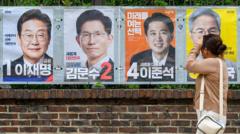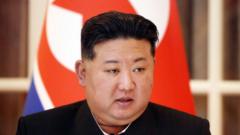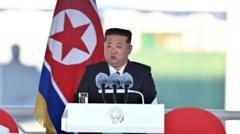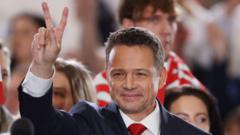The upcoming election is poised to address critical issues including economic concerns, relations with North Korea, and the nation's declining birthrate.
South Korea Prepares for Presidential Election Amidst Political Turmoil

South Korea Prepares for Presidential Election Amidst Political Turmoil
On June 3, South Korea will vote to elect a new president following the impeachment of Yoon Suk Yeol.
The election process in South Korea has become a focal point of attention as the country gears up to select a new president on June 3, 2024. This election comes in the wake of the controversial impeachment of former President Yoon Suk Yeol, who faced removal from office due to his unprecedented martial law declaration last December, which triggered nationwide unrest. The winning candidate will not only be responsible for restoring stability but also for navigating the fallout from Yoon's drastic measures, which exposed the rifts within South Korean society.
The backdrop to this election includes pressing issues such as the ever-present threat from North Korea, economic uncertainties following trade tariffs imposed by the U.S., and an alarming birthrate that ranks among the lowest globally, currently at just 0.75 for 2024. Addressing these critical challenges will be a priority for the next leader of this nation of approximately 52 million people.
Yoon's presidency was meant to run until 2027, but following his abrupt decision to declare martial law, he faced a swift impeachment by parliament. The constitutional court upheld this impeachment, leading to a snap election mandated within 60 days. Since Yoon's exit, South Korea has been led by a series of acting presidents, culminating with Lee Ju-ho stepping in just a month before the elections. This ongoing political instability sets a tense stage for the upcoming vote.
Polls indicate that Lee Jae-myung from the Democratic Party is currently the frontrunner, having previously lost to Yoon in 2022 by a narrow margin. Lee, once a factory worker and rights lawyer, seeks to transform South Korea into what he calls a "Real Republic of Korea" with equitable job opportunities. His main opponent, Kim Moon-soo from the conservative People Power Party (PPP), aims to foster an environment conducive to business and job growth.
Notably, this election features an absence of female candidates for the first time in nearly two decades, underscoring a shift in representation within South Korean politics. Voting is scheduled from 06:00 local time to 20:00, with results expected shortly after polling concludes. The newly elected president will take office immediately, without a formal transition period, adding another layer of complexity to the political landscape.
Former President Yoon, now facing criminal charges related to his actions while in office, is currently navigating legal proceedings that further complicate the public perception of the upcoming election, emphasizing the urgency for a new leader dedicated to healing divides and confronting the pressing issues facing the nation.
The backdrop to this election includes pressing issues such as the ever-present threat from North Korea, economic uncertainties following trade tariffs imposed by the U.S., and an alarming birthrate that ranks among the lowest globally, currently at just 0.75 for 2024. Addressing these critical challenges will be a priority for the next leader of this nation of approximately 52 million people.
Yoon's presidency was meant to run until 2027, but following his abrupt decision to declare martial law, he faced a swift impeachment by parliament. The constitutional court upheld this impeachment, leading to a snap election mandated within 60 days. Since Yoon's exit, South Korea has been led by a series of acting presidents, culminating with Lee Ju-ho stepping in just a month before the elections. This ongoing political instability sets a tense stage for the upcoming vote.
Polls indicate that Lee Jae-myung from the Democratic Party is currently the frontrunner, having previously lost to Yoon in 2022 by a narrow margin. Lee, once a factory worker and rights lawyer, seeks to transform South Korea into what he calls a "Real Republic of Korea" with equitable job opportunities. His main opponent, Kim Moon-soo from the conservative People Power Party (PPP), aims to foster an environment conducive to business and job growth.
Notably, this election features an absence of female candidates for the first time in nearly two decades, underscoring a shift in representation within South Korean politics. Voting is scheduled from 06:00 local time to 20:00, with results expected shortly after polling concludes. The newly elected president will take office immediately, without a formal transition period, adding another layer of complexity to the political landscape.
Former President Yoon, now facing criminal charges related to his actions while in office, is currently navigating legal proceedings that further complicate the public perception of the upcoming election, emphasizing the urgency for a new leader dedicated to healing divides and confronting the pressing issues facing the nation.

















